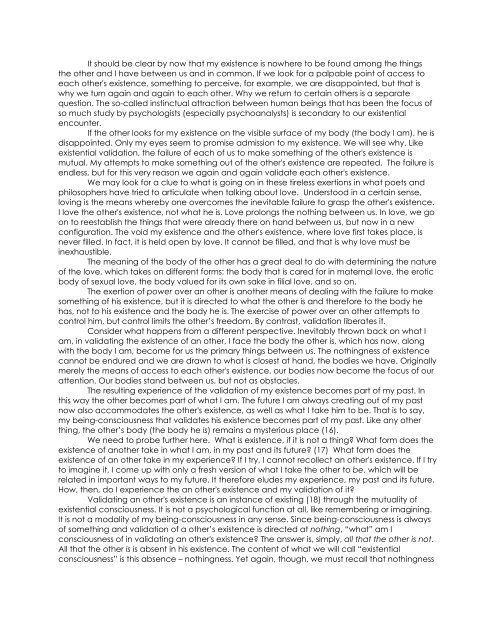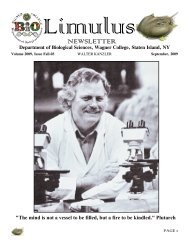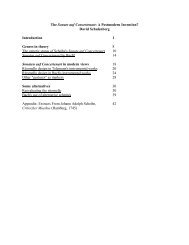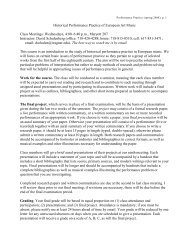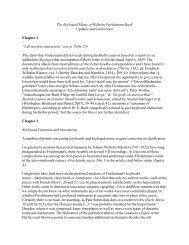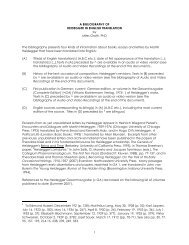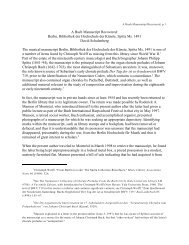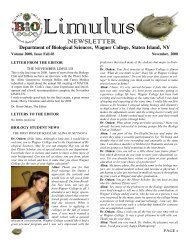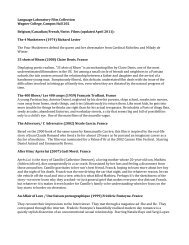SEVEN PAPERS ON EXISTENTIAL ANALYSIS ... - Wagner College
SEVEN PAPERS ON EXISTENTIAL ANALYSIS ... - Wagner College
SEVEN PAPERS ON EXISTENTIAL ANALYSIS ... - Wagner College
Create successful ePaper yourself
Turn your PDF publications into a flip-book with our unique Google optimized e-Paper software.
It should be clear by now that my existence is nowhere to be found among the things<br />
the other and I have between us and in common. If we look for a palpable point of access to<br />
each other's existence, something to perceive, for example, we are disappointed, but that is<br />
why we turn again and again to each other. Why we return to certain others is a separate<br />
question. The so-called instinctual attraction between human beings that has been the focus of<br />
so much study by psychologists (especially psychoanalysts) is secondary to our existential<br />
encounter.<br />
If the other looks for my existence on the visible surface of my body (the body I am), he is<br />
disappointed. Only my eyes seem to promise admission to my existence. We will see why. Like<br />
existential validation, the failure of each of us to make something of the other's existence is<br />
mutual. My attempts to make something out of the other's existence are repeated. The failure is<br />
endless, but for this very reason we again and again validate each other's existence.<br />
We may look for a clue to what is going on in these tireless exertions in what poets and<br />
philosophers have tried to articulate when talking about love. Understood in a certain sense,<br />
loving is the means whereby one overcomes the inevitable failure to grasp the other's existence.<br />
I love the other's existence, not what he is. Love prolongs the nothing between us. In love, we go<br />
on to reestablish the things that were already there on hand between us, but now in a new<br />
configuration. The void my existence and the other's existence, where love first takes place, is<br />
never filled. In fact, it is held open by love. It cannot be filled, and that is why love must be<br />
inexhaustible.<br />
The meaning of the body of the other has a great deal to do with determining the nature<br />
of the love, which takes on different forms: the body that is cared for in maternal love, the erotic<br />
body of sexual love, the body valued for its own sake in filial love, and so on.<br />
The exertion of power over an other is another means of dealing with the failure to make<br />
something of his existence, but it is directed to what the other is and therefore to the body he<br />
has, not to his existence and the body he is. The exercise of power over an other attempts to<br />
control him, but control limits the other’s freedom. By contrast, validation liberates it.<br />
Consider what happens from a different perspective. Inevitably thrown back on what I<br />
am, in validating the existence of an other, I face the body the other is, which has now, along<br />
with the body I am, become for us the primary things between us. The nothingness of existence<br />
cannot be endured and we are drawn to what is closest at hand, the bodies we have. Originally<br />
merely the means of access to each other's existence, our bodies now become the focus of our<br />
attention. Our bodies stand between us, but not as obstacles.<br />
The resulting experience of the validation of my existence becomes part of my past. In<br />
this way the other becomes part of what I am. The future I am always creating out of my past<br />
now also accommodates the other's existence, as well as what I take him to be. That is to say,<br />
my being-consciousness that validates his existence becomes part of my past. Like any other<br />
thing, the other’s body (the body he is) remains a mysterious place (16).<br />
We need to probe further here. What is existence, if it is not a thing? What form does the<br />
existence of another take in what I am, in my past and its future? (17) What form does the<br />
existence of an other take in my experience? If I try, I cannot recollect an other's existence. If I try<br />
to imagine it, I come up with only a fresh version of what I take the other to be, which will be<br />
related in important ways to my future. It therefore eludes my experience, my past and its future.<br />
How, then, do I experience the an other's existence and my validation of it?<br />
Validating an other's existence is an instance of existing (18) through the mutuality of<br />
existential consciousness. It is not a psychological function at all, like remembering or imagining.<br />
It is not a modality of my being-consciousness in any sense. Since being-consciousness is always<br />
of something and validation of a other’s existence is directed at nothing, “what” am I<br />
consciousness of in validating an other's existence? The answer is, simply, all that the other is not.<br />
All that the other is is absent in his existence. The content of what we will call “existential<br />
consciousness” is this absence – nothingness. Yet again, though, we must recall that nothingness


